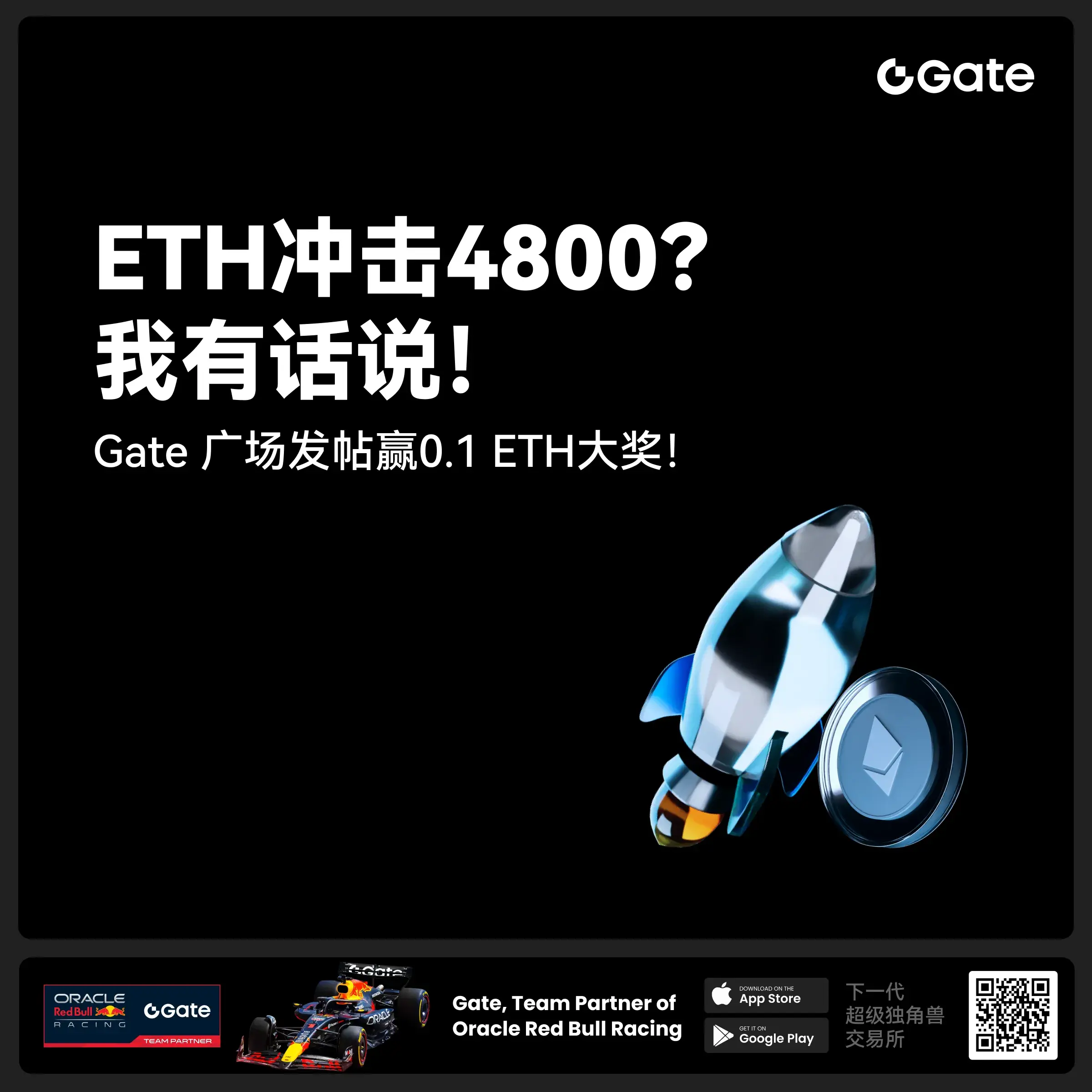- 話題
35k 熱度
21k 熱度
48k 熱度
17k 熱度
45k 熱度
20k 熱度
7k 熱度
4k 熱度
114k 熱度
- 10我的Gate時刻
29k 熱度
- 置頂
- 📢 ETH衝擊4800?我有話說!快來“Gate廣場”秀操作,0.1 ETH大獎等你拿!
牛市預言家,可能下一個就是你!想讓你的觀點成爲廣場熱搜、贏下ETH大獎?現在就是機會!
💰️ 廣場5位優質發帖用戶+X瀏覽量前5發帖用戶,瓜分0.1 ETH!
🎮 活動怎麼玩,0門檻瓜分ETH!
1.話題不服來辯!
帶 #ETH冲击4800# 和 #ETH# 在 廣場 或 K線ETH下 圍繞一下主題展開討論:
-ETH是否有望突破4800?
-你看好ETH的原因是什麼?
-你的ETH持倉策略是?
-ETH能否引領下一輪牛市?
2. X平台同步嗨
在X平台發帖討論,記得帶 #GateSquare# 和 #ETH冲击4800# 標籤!
把你X返連結提交以下表單以瓜分大獎:https://www.gate.com/questionnaire/6896
✨發帖要求:
-內容須原創,字數不少於100字,且帶活動指定標籤
-配圖、行情截圖、分析看法加分,圖文並茂更易精選
-禁止AI寫手和灌水刷屏,一旦發現取消獎勵資格
-觀點鮮明、邏輯清晰,越有料越好!
關注ETH風向,創造觀點價值,從廣場發帖開始!下一個牛市“預言家”,可能就是你!🦾🏆
⏰ 活動時間:2025年7月18日 16:00 - 2025年7月28日 23:59(UTC+8)
【立即發帖】 展現你的真知灼見,贏取屬於你的ETH大獎!
- 🎉 #Gate Alpha 第三届积分狂欢节 & ES Launchpool# 聯合推廣任務上線!
本次活動總獎池:1,250 枚 ES
任務目標:推廣 Eclipse($ES)Launchpool 和 Alpha 第11期 $ES 專場
📄 詳情參考:
Launchpool 公告:https://www.gate.com/zh/announcements/article/46134
Alpha 第11期公告:https://www.gate.com/zh/announcements/article/46137
🧩【任務內容】
請圍繞 Launchpool 和 Alpha 第11期 活動進行內容創作,並曬出參與截圖。
📸【參與方式】
1️⃣ 帶上Tag #Gate Alpha 第三届积分狂欢节 & ES Launchpool# 發帖
2️⃣ 曬出以下任一截圖:
Launchpool 質押截圖(BTC / ETH / ES)
Alpha 交易頁面截圖(交易 ES)
3️⃣ 發布圖文內容,可參考以下方向(≥60字):
簡介 ES/Eclipse 項目亮點、代幣機制等基本信息
分享你對 ES 項目的觀點、前景判斷、挖礦體驗等
分析 Launchpool 挖礦 或 Alpha 積分玩法的策略和收益對比
🎁【獎勵說明】
評選內容質量最優的 10 位 Launchpool/Gate - 和其他領域不一樣的是:你想支持一個 Web3 遊戲項目,你必須要「雙投」——既要投時間,也要投錢。

- 🎉【Gate 3000萬紀念】曬出我的Gate時刻,解鎖限量好禮!
Gate用戶突破3000萬!這不僅是數字,更是我們共同的故事。
還記得第一次開通帳號的激動,搶購成功的喜悅,或陪伴你的Gate週邊嗎?
📸 參與 #我的Gate时刻# ,在Gate廣場曬出你的故事,一起見證下一個3000萬!
✅ 參與方式:
1️⃣ 帶話題 #我的Gate时刻# ,發布包含Gate元素的照片或視頻
2️⃣ 搭配你的Gate故事、祝福或感言更佳
3️⃣ 分享至Twitter(X)可參與瀏覽量前10額外獎勵
推特回鏈請填表單:https://www.gate.com/questionnaire/6872
🎁 獨家獎勵:
🏆 創意大獎(3名):Gate × F1紅牛聯名賽車模型一輛
👕 共創紀念獎(10名): 國際米蘭同款球員衛衣
🥇 參與獎(50名):Gate 品牌抱枕
📣 分享獎(10名):Twitter前10瀏覽量,送Gate × 國米小夜燈!
*海外用戶紅牛聯名賽車折合爲 $200 合約體驗券,國米同款球衣折合爲 $50 合約體驗券,國米小夜燈折合爲 $30 合約體驗券,品牌抱枕折合爲 $20 合約體驗券發放
🧠 創意提示:不限元素內容風格,曬圖帶有如Gate logo、Gate色彩、週邊產品、GT圖案、活動紀念品、活動現場圖等均可參與!
活動截止於7月25日 24:00 UTC+8
3
懂得避險才是真穩健!揭穿指數投資穩賺不賠神話,投資人如何應對台海危機?
在「買指數就能穩賺」的普遍信仰下,越來越多台灣投資人將資金重押在台股 ETF 如 0050 上。但一篇在 X 平台上發布的貼文,引發了廣泛討論與省思。量化交易員 Jackson Hu 直言,指數投資在近 20 年多頭市場下被過度吹捧,忽略了台海危機與地緣政治可能帶來的致命風險。
講這有點逆風,但必須說,指數投資在近20年的大多頭被過度吹捧。
如果翻過去100年歷史,也有好幾次整整10年指數不動的情況。
如果是單一國家的指數,那就更危險了,只要發生戰爭或政策重大錯誤,那可能低迷更久。… pic.twitter.com/WDf6DkuYtf
— Jackson Hu (@sheng_invest) April 19, 2025
十年不動、崩盤突襲?歷史數據早已給出警訊
Jackson Hu 指出,若回顧過去 100 年,美國等各國股市都曾出現多次長達十年「原地踏步」的情況,甚至也會有單一國家因重大事件導致指數重挫的極端行情。
他在貼文中附上一張名為「SURPRISE!」的虛構圖表,曲線在持續上升近千日後突遇崩盤,直線墜落。這不僅是數據的視覺衝擊,更像是對投資人的當頭棒喝——「市場永遠都有黑天鵝」。
(大部分人根本不打算財富自由!財經作家長文揭露:指數投資根本不可能扭轉階級)
台股風險更高?地緣政治一觸即發的警鐘
Jackson 特別點出台灣市場的風險更為集中。若台海爆發戰爭,台股恐大跌六成,櫃買更可能重挫八成,連代表市場大盤的 0050 也「沒用」。他提醒:
相比全球股市跌三成的可能幅度,台灣股市受到的衝擊將是災難性的。這不是危言聳聽,而是應該要事先具備的心理準備。
(已賣光台積電?AllianceDAO:川普關稅推升台海危機,清倉美股僅持比特幣、SOL 與迷因幣)
火雞效應隱憂:投資人易忽略的系統性風險
「火雞效應 (Turkey illusion)」意指人們過度依賴過去的經驗來預測未來,可能會導致災難性的錯誤。套用在投資上,就是投資人因長期享有穩定報酬,誤以為未來也將一帆風順。
Jackson 對此警告,「台灣當前的地緣政治風險已不低於 10%,投資人不應再將過去的多頭行情視為理所當然。」不少網友也認同這種「穩賺不賠」的迷思正掩蓋潛藏危機,尤其是在資產、工作與生活都跟台灣綁定的情況下,將難以有效分散風險。
與台海戰爭爆發負相關的資產有哪些?
若台海局勢惡化,有哪些資產可能逆勢上漲?Jackson 建議,應納入具抗通膨、避險性質的非股票資產,例如:
原物料與能源:戰爭可能推升原油與天然資源價格。
加密貨幣:部分投資人將比特幣視為避險資產。
海外房產:專注於地緣穩定的國家如澳洲或加拿大等。
透過這些資產的配置,不僅能對沖台灣市場的潛在風險,更能在全球性危機中維持資產抗壓性。
台灣人該怎麼做?三大應對策略一次看
針對高風險環境,Jackson 與多位網友也提供具體建議:
海外資產配置:至少部分資金應移往國際市場,避免雞蛋全放在一個「台灣」籃子中。
多元化投資組合:股票以外,納入房產、原物料、債券與加密貨幣等資產類別。
移民與備案規劃:當然,國內資產在戰爭爆發後,再多也形同虛設。具備移民條件與相關備案,將是保命與保財的重要手段。
重新思考「穩健」兩字的真正含義
指數投資確實提供了一種相對低風險的投資方式,但在面對極端事件與高地緣政治風險的當下,台灣投資人勢必要重新審視自身的資產結構。
所謂的「穩健」,不只是報酬穩定,更是「能撐過最壞時刻的資產配置能力」。當市場看似平靜如昔,或許正是未雨綢繆的最好時機。
這篇文章 懂得避險才是真穩健!揭穿指數投資穩賺不賠神話,投資人如何應對台海危機? 最早出現於 鏈新聞 ABMedia。